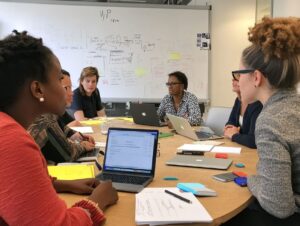Exam preparation is an essential component for high school students seeking to achieve academic success.
By implementing effective strategies, students can effectively manage the complexities associated with studying, time management, and stress reduction.
This guide provides insights into creating a personalized study plan, utilizing active learning techniques, and addressing test anxiety.
Additionally, it presents practical test-taking strategies designed to optimize performance on exam day.
Engaging with this material will equip students with the necessary tools to excel and enhance their confidence.
Why is Exam Preparation Important?

Exam preparation is essential for high school students, as it plays a significant role in their academic performance and overall learning experience.
A systematic approach to exam preparation involves effective time management, appropriate study techniques, and strategies for managing stress, all of which contribute to a solid foundation for future success.
By employing comprehensive revision methods, students enhance their knowledge retention while also developing self-discipline and motivation, thereby reducing the anxiety typically associated with test-taking.
Recognizing the importance of exam preparation give the power tos students with the necessary tools to navigate their educational journeys with confidence and resilience.
Creating a Study Plan
Developing a study plan is a crucial component of effective exam preparation, as it enables students to allocate their time efficiently and establish clear academic objectives.
A well-organized study schedule facilitates the prioritization of subjects and topics, ensuring a balanced approach to the learning process.
By utilizing revision timetables that include designated time for breaks and the allocation of resources for study materials, high school students can optimize their study sessions to improve retention and comprehension.
Furthermore, implementing a goal-oriented learning framework can significantly enhance motivation and accountability among students.
How to Effectively Manage Time
Effectively managing time is an essential skill for high school students who aspire to succeed in their exam preparation, enabling them to balance study commitments with personal activities.
By developing a detailed study schedule, students can allocate specific time slots for each subject, ensuring comprehensive coverage of their curriculum. The incorporation of focus techniques, such as the Pomodoro Technique, facilitates sustained concentration and enables students to determine optimal intervals for scheduled breaks to enhance performance. This structured approach aids in reducing cognitive load and improving information retention.
Utilizing tools such as digital calendars or planner applications can streamline the process of tracking time and deadlines, providing a visual reminder of upcoming exams and assignments.
Furthermore, students may implement performance tracking methods by setting achievable milestones and reflecting on their progress weekly, thereby maintaining motivation and accountability.
Incorporating short, intentional breaks during study sessions not only rejuvenates the mind but also reinforces effective study habits, allowing for better focus during learning blocks.
By proactively organizing their schedule and implementing these strategies, students can significantly elevate their potential for academic excellence.
Strategies for Organizing Materials
Organizing study materials is essential for high school students to facilitate effective exam preparation and improve learning efficiency. Employing effective note-taking techniques enables students to summarize and retain information more efficiently, while the creation of flashcards and concept maps reinforces understanding and supports retrieval practice.
In the current competitive educational environment, the development of systematic strategies for organizing content is increasingly important. This includes categorizing notes by subject or topic, which not only enhances clarity but also makes review sessions more productive.
Study groups provide an environment conducive to collective problem-solving, thereby improving students’ understanding of complex subjects. These collaborative sessions can be further enriched by utilizing online platforms that offer a wide array of videos, interactive quizzes, and virtual study aids.
By embracing these diverse resources, students can tailor their study approaches to align with their individual learning preferences, ultimately enhancing their overall academic performance.
Effective Study Techniques
Utilizing effective study techniques is essential for high school students seeking to enhance their learning outcomes and improve information retention. Methods such as active recall and spaced repetition have been demonstrated to promote deeper understanding and long-term memory retention of the subject matter.
By incorporating these techniques into their study routines, students can optimize their academic performance while minimizing cognitive load during exam preparation. Furthermore, embracing diverse learning styles can accommodate individual preferences, thereby ensuring a more personalized and effective study experience.
Active Learning Methods

Active learning methods, including active recall and collaborative learning, are integral to effective study techniques for high school students. These methods promote active engagement with the material, which significantly enhances both understanding and retention of information.
Through participation in discussions and the implementation of techniques such as think-pair-share, students reinforce their comprehension of concepts through social interaction. The practice of self-testing not only prepares students for examinations but also fosters resilience, equipping them to confront challenges effectively.
Feedback mechanisms associated with these assessments provide learners with valuable insights into their strengths and weaknesses.
When students collaborate in study groups, they establish a community that encourages collective effort, deepens understanding, and cultivates an environment of shared learning, thereby fundamentally enhancing their educational experience.
Memorization Techniques
Memorization techniques, such as mnemonic devices and flashcards, serve as effective tools for high school students seeking to enhance information retention during exam preparation. These methodologies provide structured approaches to recalling complex information and are particularly beneficial for memorizing definitions, formulas, or lists.
For example, mnemonic devices create memorable associations, facilitating information retrieval in high-pressure test environments. Conversely, flashcards promote knowledge reinforcement through active recall, ensuring that learning transcends passive absorption of information.
When students visualize their goals, they are better positioned to align their daily study habits with these aspirations, thereby enhancing their motivation to learn. By incorporating these practices into their routines, individuals not only improve their retention capabilities but also cultivate a positive mindset that contributes to a more rewarding academic experience.
This comprehensive approach, which integrates practical memorization strategies with mental motivation techniques, ultimately lays the groundwork for enhanced performance throughout their educational journey.
Managing Stress and Anxiety
Managing stress and anxiety is a crucial component of effective exam preparation for high school students, as these factors directly impact their academic performance.
The implementation of healthy coping mechanisms, such as mindfulness practices and physical wellness strategies, can significantly alleviate exam-related anxiety.
By cultivating a positive mindset, students can enhance their self-discipline and motivation, thereby approaching examinations with increased confidence.
Moreover, recognizing the signs of stress and developing effective strategies for anxiety reduction can ultimately lead to improved academic outcomes.
Healthy Coping Mechanisms
Implementing effective coping mechanisms is essential for high school students to manage stress and maintain focus during exam preparation. Prioritizing physical wellness through proper nutrition and sleep hygiene significantly contributes to enhancing cognitive function and overall well-being.
Incorporating relaxation techniques, such as deep breathing exercises or yoga, can assist students in managing anxiety and fostering a sense of calm. By establishing a balanced lifestyle, students not only support their academic performance but also bolster their mental health.
Engaging in regular physical activity elevates endorphin levels and promotes resilience against stress. Students should strive to participate in activities they find enjoyable, whether that involves team sports, jogging, or dance, to maintain motivation.
Additionally, coupling physical activity with a well-rounded diet that is rich in nutrients—such as fruits, vegetables, whole grains, and lean proteins—can further nourish their bodies and minds, thereby enhancing concentration and memory retention.
Cultivating healthy sleep hygiene through a consistent sleep schedule is vital for ensuring restorative rest, which is crucial for cognitive clarity.
Moreover, mindfulness meditation and progressive muscle relaxation can serve as effective strategies for stress management, providing students with moments of tranquility amidst their demanding schedules.
Tips for Reducing Test Anxiety
Reducing test anxiety is critical for high school students aiming to achieve optimal performance during examinations. Establishing clear goals and preparation strategies can effectively alleviate anxiety by providing a structured approach to studying and test-taking.
By breaking down study material into manageable segments and setting specific deadlines for each topic, students can develop a roadmap that clarifies their objectives and mitigates feelings of overwhelm. Furthermore, encouraging regular self-assessment through practice tests or quizzes not only enhances familiarity with the content but also cultivates a sense of control over their preparation.
Additionally, employing relaxation techniques, such as deep breathing or visualization, before and during the examination can significantly improve focus and composure. Ultimately, the integration of these practical methods will not only enhance confidence but also instill a sense of accomplishment, transforming test anxiety into a manageable challenge.
Test-Taking Strategies

Effective test-taking strategies are essential for high school students seeking to optimize their performance during examinations. A thorough understanding of the exam format and familiarity with the types of questions presented can significantly enhance confidence and reduce anxiety.
Employing retrieval practice, such as working with past papers and quizzes, reinforces knowledge and improves recall when taking tests. Furthermore, maintaining focus and managing time effectively throughout the examination can lead to more favorable performance assessments.
Approaching Different Types of Questions
Effectively addressing different types of questions is essential for high school students to optimize their test-taking strategies and enhance their performance evaluations. Understanding the distinct requirements of multiple-choice questions as opposed to essay questions enables students to prioritize their study efforts and tailor their responses accordingly.
By doing so, they can allocate their time and resources more efficiently, ensuring that they focus on the formats most critical to their academic success. For example, recognizing that multiple-choice questions typically necessitate quick recall of information allows students to concentrate their review on key concepts and definitions.
In contrast, essay questions require a deeper level of comprehension and the ability to synthesize information; therefore, practicing the outlining of answers in advance can prove advantageous. By refining their critical thinking skills, students can approach each question type with confidence, resulting in clearer and more coherent answers that accurately reflect their understanding of the material.
Tips for Staying Focused and Avoiding Careless Mistakes
Maintaining focus during examinations is essential for high school students to avoid careless errors and ensure accurate responses. Utilizing concentration techniques, such as deep breathing exercises and visualization, can significantly enhance a student’s ability to remain attentive throughout the test. Implementing effective distraction management strategies minimizes interruptions and fosters greater engagement with the examination materials.
Furthermore, cultivating self-discipline in study habits contributes to improved focus during exams, ultimately leading to enhanced test performance.
Along with these strategies, establishing a structured study environment can further elevate concentration levels. Eliminating unnecessary distractions, such as mobile phones and excessive noise, creates an atmosphere conducive to productive study sessions.
Students may also benefit from practicing time management by segmenting study materials into manageable portions. This approach allows for focused periods of work interspersed with brief breaks to facilitate rejuvenation.
During the examination itself, it is crucial to employ techniques such as active reading, which involves underlining key points to enhance comprehension.
By implementing these practical strategies, students can achieve not only a heightened level of focus but also a significant reduction in errors, thereby paving the way for improved test outcomes.
Frequently Asked Questions
1. What are some general exam preparation tips for high school students?
Some general tips include creating a study schedule, staying organized, and taking breaks while studying.
2. How can I make the most out of my study schedule for exams?

Make sure to allocate specific blocks of time for each subject, focus on one subject at a time, and review material from previous exams.
3. What should I do the night before an exam?
Get a good night’s sleep, review your notes and study materials, and avoid cramming or pulling an all-nighter.
4. Are there any specific techniques I can use while studying for exams?
Some effective techniques include creating flashcards, practicing past exam questions, and teaching the material to someone else.
5. How can I stay motivated while preparing for exams?
Set goals for yourself, reward yourself after completing a study session, and remind yourself of the long-term benefits of doing well on exams.
6. What should I do if I feel overwhelmed while studying for exams?
Take a step back and prioritize your studying, break down tasks into smaller, manageable chunks, and reach out to teachers or peers for support.




